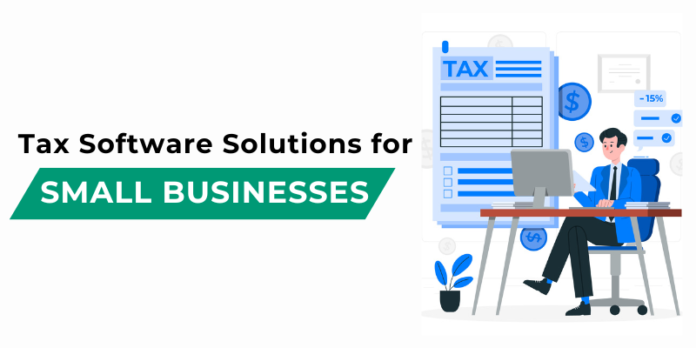Nowadays complex tax landscape, small businesses face numerous challenges, including tax compliance. Many businesses are turning to tax software solutions to streamline their tax processes and reduce the risk of errors. These tools offer a range of benefits, from automating calculations to generating accurate tax returns.
In this blog, we will explore the benefits of tax software for small businesses, discuss key features to look for, and highlight some of the top tax software solutions available in the market today.
Why Small Businesses Need Tax Software
For small business owners facing multiple responsibilities, tax software provides several advantages:
1. Simplifies Tax Compliance
Tax software is designed to streamline the entire tax process by automating calculations, keeping up with the latest tax laws, and generating necessary forms. This helps small businesses avoid costly errors and penalties.
2. Saves Time and Resources
Manually managing taxes can be time-consuming. Tax software can help to automate repetitive tasks, allowing business owners to focus on growth and operations.
3. Improves Accuracy
Human error is a common issue in manual tax filing. Tax software reduces errors through automated calculations and pre-filled forms, ensuring accuracy in financial reporting.
4. Enhances Data Security
Cloud-based tax solutions offer secure data storage with encryption, safeguarding sensitive business and financial information.
5. Cost-Effective Solution
It may not always be possible for small firms to hire a full-time accountant or tax expert. Tax software offers a cost-effective substitute that meets necessities.
Key Features to Look for in Tax Software
When selecting tax software, consider the following essential features:
1. User-Friendly Interface
A simple interface makes it easy for business owners and employees to navigate the software, even without extensive accounting knowledge.
2. Integration with Accounting Software
Look for tax software that integrates seamlessly with accounting platforms like QuickBooks or Xero to streamline financial management.
3. Real-Time Updates
Tax laws and regulations change frequently. Ensure the software offers real-time updates to stay compliant with the latest tax codes.
4. Cloud-Based Access
Cloud-based tax software allows you to access your data from anywhere, facilitating remote work and collaboration with accountants.
5. Multiple Tax Forms and Filing Options
The software should support various tax forms (e.g., 1099, W-2) and offer both federal and state filing capabilities.
6. Data Import and Export Features
Efficiently importing financial data from spreadsheets or accounting systems saves time during tax season.
7. Customer Support and Training
Opt for software that offers reliable customer support, tutorials, and training to assist you whenever needed.
How to Choose the Right Tax Software for Your Business
Selecting the right tax software depends on your business’s specific needs. Here are some tips to guide your decision:
1. Identify Your Requirements
Determine whether you need basic tax preparation tools or advanced features like multi-state filing and audit support.
2. Consider Your Budget
Compare pricing plans and ensure the software offers the best value for your investment. Many platforms offer tiered pricing based on the features you need.
3. Check Compatibility
Ensure the software is compatible with your existing accounting tools and business processes.
4. Read Reviews and Ratings
Research user reviews to gain insights into real-world experiences with the software.
5. Take Advantage of Free Trials
Many tax software providers offer free trials. Use this opportunity to test the platform before committing.
The Role of Cloud-Based Tax Software
Cloud-based tax software is becoming increasingly popular among small businesses. Here’s why:
1. Accessibility and Flexibility
With cloud-based solutions, you can access your tax data from any device with an internet connection, making it easier to collaborate with accountants or team members.
2. Automatic Updates
Cloud-based software automatically updates itself with the latest tax laws, ensuring compliance.
3. Scalability
As your business grows, cloud-based tax software can scale to accommodate additional users, data, and functionalities.
4. Enhanced Security
Reputable cloud providers offer advanced security features, such as encryption, firewalls, and regular backups.
Also Read: How Cloud Solutions Can Transform Small Businesses
Tips for Maximizing the Benefits of Tax Software with Drake Software Hosting and Lacerte Hosting
Hosting solutions like Drake Software Hosting and Lacerte Hosting empower small businesses to use tax software with enhanced accessibility, security, and efficiency. To make the most of these hosted tax solutions, follow these practical tips:
1. Keep Records Organized
Ensure that all your financial documents, receipts, and invoices are systematically organized. With hosted solutions like Lacerte or Drake Software, uploading and managing data on the cloud becomes easier when your records are structured.
2. Train Your Staff
Your team should be well-versed in using Drake Software Hosting or Lacerte Hosting to avoid delays during tax season. Cloud hosting platforms offer user-friendly interfaces and training resources, so invest time in ensuring employees understand how to access data, run reports, and utilize features efficiently.
3. Schedule Regular Updates
Periodic updates to your financial data are crucial for accurate tax reporting. With Drake or Lacerte Hosting, real-time synchronization ensures your tax software reflects the latest changes. Regularly reviewing and updating your accounts can help you stay ahead during busy tax seasons.
4. Leverage Integration
Maximize the benefits of Lacerte Hosting or Drake Software Hosting by integrating them with other accounting tools, such as QuickBooks. Seamless integration streamlines workflows, reduces duplicate entries, and enhances overall financial management.
Conclusion
Tax Software Hosting has revolutionized how small businesses manage their taxes, offering unparalleled convenience, accuracy, and cost savings. By hosting tax software on the cloud, businesses can access their tools and data from anywhere, ensuring real-time updates, enhanced security, and seamless collaboration. Choosing the right hosted tax software solution and leveraging its features allows small business owners to focus on growing their ventures without worrying about tax compliance complexities.
Whether you’re a freelancer, small business owner, or startup founder, investing in the right tax software hosting solution is a step toward financial efficiency and peace of mind. Explore the hosting options discussed in this blog to find the one that best suits your business needs and simplifies your tax management processes!
